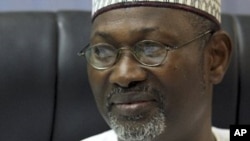Nigeria's electoral commission has hundreds of votes to organize this year, none bigger than April's presidential contest. So the commission's first vote of the year was an important test case for improving transparency.
Emmanuel Uduaghan won re-election as governor of Nigeria's southern Delta state this past week, returning to a post he was denied after courts overturned his 2007 election because of intimidation and fraud.
Thousands of police and soldiers were on duty in a state where there are still remnants of a rebellion against how profits from the oil-rich Niger Delta are distributed. The head of the Independent National Electoral Commission, or INEC, was on hand to personally oversee the vote count.
President Goodluck Jonathan says the vote was a vast improvement over previous elections, congratulating INEC for a performance that he says shows Nigeria is well on its way to credible general elections in April.
Ruling-party official Prosper Umoko agrees. He says ballot papers arrived on time in the area of Otor Ogor and security forces and electoral officials prevented any fraud.
"The election here was very successful," said Umoko. "There is no problem. There is no fighting. They did their work very well."
Chief Friday Okowara says the Delta state vote shows INEC is ready for April.
"If elections are held like this in all the places, we will have no problems," Okowara. "There have not been problems. There is no agitation for this and that, and the officers have performed their work credibly. I commend the effort of the INEC. If other areas are like this, then we shall be happy in this country."
But other areas of Delta state were not like Otor Ogor.
In the town of Ughelli, opposition supporters say local officials helped steal the election by manipulating electoral lists and delivering ballot papers late so fewer opposition members could vote.
Gabriel Asakene blames INEC chairman Attahiru Jega.
"There was no election," said Asakene. "People are out getting to their polling stations and there is no material. What excuse are they going to give? Jega has failed."
"The situation is very tense," said Philip Omakoma, who coordinated the campaign of the leading opposition candidate, Great Ogboru. "There is not enough security. There are not enough vehicles that are provided by INEC. Some areas are not fair, but in some areas it is OK."
Voter turn-out across the state was high with Uduaghan polling just over 275,000 votes to Ogboru's 138,000.
INEC officials admit there were problems with some of the voter rolls in Delta state. The logistical challenges of registering voters in Africa's most populous country is the main reason why the commission asked that nationwide voting be delayed from January to April.
Opposition politicians say holding legislative, presidential, and gubernatorial elections all in the same month will only magnify electoral commission weaknesses and stretch thin the nation's security forces.
President Jonathan says electoral reforms are in place to deliver a far fairer vote than the election that he and then-president Umaru Musa Yar'Adua won in 2007. Mr. Jonathan hopes to secure the ruling-party nomination for April's vote during a party convention in the capital Thursday.




